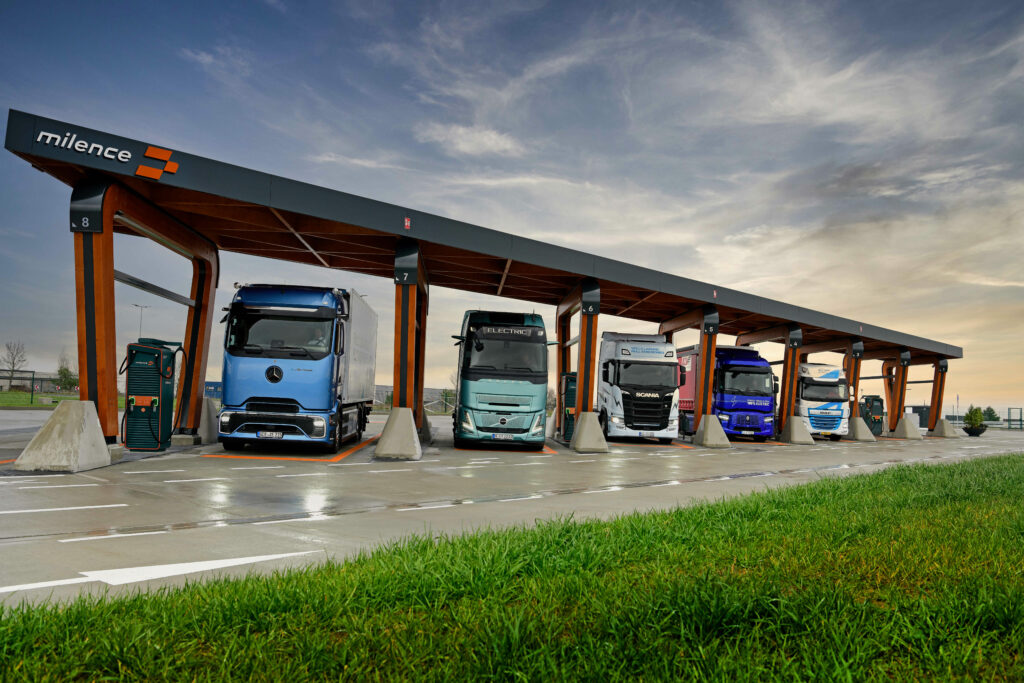The transportation industry has been going through a transformation, due to the growing demand for more sustainable solutions. Within this sector, battery electric trucks have emerged proving to be a game changer in terms of efficiency, environmental impact and technological advancements.
This article delves into the advantages of battery electric trucks highlighting efficiency, utilization of green energy sources, OEM development, and the importance of interoperability and data storage.
Battery Electric Trucks and Enhanced Vehicle Efficiency
Battery electric trucks represent a leap forward when it comes to vehicle efficiency. Unlike diesel trucks these electric counterparts utilize motors for power generation resulting in quick acceleration and smoother operation. This not only boosts vehicle performance but also reduces wear and tear, on various components ultimately extending their lifespan. Moreover, with mechanisms compared to combustion engines, maintenance requirements are reduced significantly. As a result, fleet operators experience less downtime and increased operational efficiency.
Battery Electric Trucks: Improved Energy Efficiency
Battery electric trucks are more energy efficient than diesel trucks. They can achieve a source-to-wheel electrical efficiency of 70-80 percent, which means that only one-fourth of the energy that is produced at the source is lost. The rest is used to propel the truck forward. This is significantly better than the existing diesel trucks. In addition, battery-electric power trains are found to be less sensitive to changes in energy prices than diesel because they have lower energy consumption per km than diesel trucks. This makes their Total Cost of Ownership less sensitive to charging costs variation than diesel trucks’ sensitivity to the increase in diesel fuel price.
Green Energy: Paving the Way for a Cleaner Future
One of the advantages offered by battery electric trucks is their potential to drastically reduce greenhouse gas emissions.
According to the International council on Clean Transportation, battery electric trucks emit 63% less GHG emission than diesel. Although trucks and buses represent just 2% of vehicles on the road, they contribute to a quarter of transport-related emissions, making them the highest emitting vehicles on the road.
Battery electric trucks can be charged using electricity from renewable sources, such as wind, solar, and hydroelectric power. Shifting towards clean energy sources helps mitigate the environmental impact of traditional diesel trucks, which have much higher carbon emissions. By embracing battery electric trucks, the transportation sector can contribute to a cleaner, more sustainable future while also benefiting from the reduced operating costs associated with it.

OEMs Betting on EV Technology: A Sign of Industry Transformation
Major OEMs have been placing significant bets on electric vehicle (EV) technology, particularly battery electric trucks. This industry-wide support demonstrates a growing recognition of the potential of electric trucks in commercial applications.
Well-established players and newcomers alike are investing in research and development, production facilities, and charging infrastructure to meet the increasing demand for electric trucks. Some of these OEMs include Daimler, MAN, Scania, Volvo, and Renault trucks. This OEM commitment not only spurs innovation but also fosters healthy competition, leading to more advanced and efficient electric truck models.
Interoperability and Data Storage: Smart Fleet Management
Battery electric trucks are not only revolutionizing how vehicles are powered, but they are also transforming fleet management through enhanced interoperability and data storage capabilities. Advanced telematics systems enable real-time tracking of vehicle performance, battery health, and charging status. This data empowers fleet managers to optimize routes, reduce downtime, and maximize energy efficiency.
Moreover, the shift to electric trucks provides an opportunity to integrate vehicles into a broader smart grid ecosystem, where they smartly integrate with renewables and energy storage can participate in demand-response programs, balancing energy supply and demand while offering grid stability.

Infrastructure
Beyond the vehicles themselves, one of the critical factors influencing the success of this shift is infrastructure development. While concerns regarding charging infrastructure once plagued the electric vehicle market, the landscape has evolved dramatically. The knowledge gathered from establishing charging stations for electric cars has paved the way for a smoother transition to electrify the trucking industry.
With advancements in megawatt-capacity charging technology and first regulatory and funding initiatives set up by European and national policymakers, market players start to lay the foundations for a successful electric heavy duty vehicle adoption. Milence, stands at the forefront of this movement, actively contributing to the infrastructure expansion crucial for the successful integration of battery electric HDV. Through innovative partnerships and a commitment to driving change, Milence is poised to play a pivotal role in shaping the future of more sustainable road transport.
Conclusion
Battery electric trucks have emerged as a compelling solution for the transportation industry, offering a multitude of benefits that extend beyond efficiency. From improved vehicle performance, integration of advanced data storage and interoperability, and a reduction of carbon emissions, the electric truck revolution is reshaping the future of road transport.



